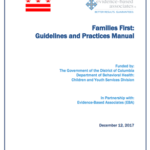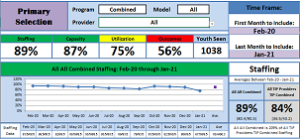
Evidence-Based Associates (EBA) has worked with the District of Columbia since 2009 to help oversee the implementation of a variety of evidence-based programs for at-risk youth and their families.
Families First Project (with DBH) | Jan. 2011-present
Under Families First, EBA provides Implementation support (i.e. program development and program implementation support) services as Choice Providers implement chosen EBPs for various populations of children and families. Under the direction of DBH Children and Youth Services Division leaders, EBA supports and facilitates all aspects of the training and post-training activities for each EBP model. CSAs who elect and are chosen to deliver evidenced based treatments will be trained and provided with on-site follow-up and support. EBA, in conjunction with DBH, develops and executes procedures and processes for client identification, referral, screening and placement associated with each EBP.
The implementation of "Families First" has created home-based, family-focused alternatives for children at risk of out-of-home placement. Also, the expert consultants contracted within Families First train therapists to develop new and stronger skills to bring families back together where children have been placed in foster care, and to help families gain skills that prevent the need for placement or outside intervention.
Below are the models currently in use in the Families First project in the District of Columbia.
Description
Child Parent Psychotherapy for Family Violence (CPP-FV) is a therapeutic intervention for young children with a history of trauma exposure or maltreatment and their caregivers. CPP-FV supports child development, restores the child-parent relationship and the overall feelings of safety, while reducing symptoms associated with the experience of trauma.
Age & Delivery
0-6 years old
Typically conducted in a(n): Adoptive Home, Birth Family Home, Foster Home, and Outpatient Clinic.
Inclusionary Criteria
Child victims or witnesses of:
- family violence
- intimate partner violence
- child physical abuse
- child sexual abuse
Exclusionary Criteria
Child:
- must have a trauma or maltreatment history
- does not have a significant caregiver participating in treatment
Treatment Duration/Rate
50 sessions or approximately 1 year
Services Provided By
- Department of Behavioral Health
- Managed care organizations
Providers
Please contact us at obuckson@ebanetwork.com for a current list of providers and their contact info
Description
Parent Child Interaction Therapy (PCIT) is a supported treatment for young children who are experiencing extreme behavioral difficulties. It places emphasis on improving the quality of the parent-child relationship and changing parent-child interaction patterns.
Age & Delivery
- 2-6 years old
- Outpatient Clinic
Inclusionary Criteria
Child who exhibits:
- loss of temper
- property destruction
- stealing
- fighting
- general difficulty playing appropriately
Child must live with one or both parents or in a stable foster homes
Children must be a resident or ward of the District of Columbia
Exclusionary Criteria
Child is diagnosed with:
- autism
- PDD
- exclusive ADHD
- children whose parents have sexually abused their children (or convicted of such a crime) or who have an active investigation pending are not eligible for PCIT
- parents with active substance abuse (should be referred for substance abuse treatment before being referred for PCIT)
- parents with an IQ below 7
Treatment Duration/Rate
Children and caregiver participate in a series of therapy sessions: approximately 12 to 16 sessions.
Services Provided By
Managed care organizations
Providers
Please contact us at obuckson@ebanetwork.com for a current list of providers and their contact info
Description
Functional Family Therapy (FFT) is a family focused intervention for at-risk and juvenile justice involved youth.
Age & Delivery
- 10-18 years old
- Typically conducted in a(n): Adoptive Home, Birth Family Home, Foster Home, and Outpatient Clinic.
Inclusionary Criteria
Child/Youth and their families whose range of problems include but are not limited to:
- acting out
- conduct disorder
- alcohol and/or substance abuse
- limited access to resources
- a range of diagnose
Exclusionary Criteria
Child/Youth who is
- actively suicidal
- actively homicidal
- actively psychotic without medication stabilization
Youth in respite or emergency care
Youth who will not be returning home within 30 days
Youth not living with permanent/long-term caregiver
Treatment Duration/Rate
Families participate in a series of sessions over a 3-5 month treatment period.
Services Provided By
Department of Behavioral Health
Providers
Please contact us at obuckson@ebanetwork.com for a current list of providers and their contact info
Description
MultisystemicTherapy (MST) is an intensive family- and community-based treatment that addresses the multiple determinants of serious antisocial behavior in juvenile offenders.
Age & Delivery
- 12-17 years old
- Typically conducted in a(n): Adoptive Home, Birth Family Home, Foster Home, and Outpatient Clinic. Telehealth sessions could be an option for extreme circumstances.
Inclusionary Criteria
Child/Youth and their families whose range of problems include but are not limited to:
- acting out
- conduct disorder
- alcohol and/or substance abuse
- limited access to community resources
- a range of diagnose
- Pre- Dispositional Risk Assessment (PDRA) 2 or higher
Exclusionary Criteria
Child/Youth who is
- actively suicidal
- actively homicidal
- actively psychotic without medication stabilization
- Pre- Dispositional Risk Assessment (PDRA) below a 2
- Youth in respite or emergency care
- Youth who will not be returning home within 30 days
- Youth not living with permanent/long-term caregiver
Treatment Duration/Method
Families participate in 3 to 4 sessions per week over a 2 to 5 months treatment period
Average hours of therapy is 60
Providers
Please contact us at obuckson@ebanetwork.com for a current list of providers and their contact info
Description
Transition to Independence Process (TIP) is a practice model which prepares youth and young adults (ages 14-29) with emotional and behavioral challenges for the transition to adult roles by engaging them in their own futures planning while providing developmentally-appropriate supports. TIP involves youth/young adults, their families, and other key players in a process that facilitates movement towards greater self-sufficiency and successful achievement of their goals.
Age & Delivery
- 14-29 years old
- Delivered the in family’s natural environment-homes, schools, community.
Inclusionary Criteria
Youth/ Young Person:
- with Emotional and Behavioral difficulty
Exclusionary Criteria
Youth/ Young Person:
- with no Emotional and Behavioral difficulty
Treatment Duration/Rate
12 to 18 months
Providers
Please contact us at obuckson@ebanetwork.com for a current list of providers and their contact info
Description
Trauma-Focused Cognitive Behavioral Therapy (TF-CBT) is an intervention designed to help children, youth, and their parents overcome the negative effects of traumatic life events and address feelings.
Age & Delivery
- 4-18 years old
- Typically conducted in a(n): Adoptive Home, Birth Family Home, Foster Home, and Outpatient Clinic.
Inclusionary Criteria
Child/Youth, who have a history of at least one significant potentially traumatic event to include but not limited to:
- sexual assault
- physical assault
- witnessing serious violence in the home or community
- unexpected traumatic death of a loved one
- motor vehicle accident
- dog attack
- exposure to disasters
- exposure to terrorist attacks
- exposure to war trauma
Exclusionary Criteria
Child/ Youth:
- does not have a trauma history
- does not have a significant mental health symptom(s) related to a traumatic event
- has severe cognitive disabilities, autism spectrum disorder
- has other difficulties that make it impossible for them to engage in cognitive therapy
Treatment Duration/Rate
Children participate in a series of approximately 12 to 16 therapy sessions.
Services Provided By
Department of Behavioral Health Managed care organizations
Providers
Please contact us at obuckson@ebanetwork.com for a current list of providers and their contact info
Description
Trauma Systems Therapy (TST) is a comprehensive model for treating traumatic stress in children and adolescents that adds to individually-based approaches by specifically addressing the child’s social environment and/or system of care. TST is designed to provide an integrated and highly coordinated system of services guided by the specific understanding of the nature of child traumatic stress. TST focuses on the interaction between the child’s difficulties regulating their emotions and the deficits within the child’s social environment.
Age & Delivery
- 6-18 years old
- TST is a planning approach that includes input from children’s homes, schools, community.
Inclusionary Criteria
Child/Youth/ Young Person has:
- been exposed to trauma
- plausible trauma histories, evidencing difficulty regulating emotional and behavioral states
- dysregulation being plausibly related to the trauma history
- has stable housing or a plan to achieve stable housing in the community
Exclusionary Criteria
Child/Youth/ Young Person: TST is applicable to a wide range of populations and service settings. Therefore, exclusion criteria will be determined at the clinical discretion of the team at each provider site.
Treatment Duration/Rate
Average length of stay 9-18 months.
Services Provided By
Department of Behavioral Health
Providers
Please contact us at obuckson@ebanetwork.com for a current list of providers and their contact info
EBA's role in the Families First project can be broken into 4 different categories.
Needs Assessment: Identify ideal evidence-based programs when and where they are needed in the District
Implementation Support: Provider support to community-based provider agencies, to ensure they are successful in the shift to evidence-based programming
Service Provider Oversight: Monitor providers adherence to the EBP Hiring Manual; work to ensure policies and procedures are in place to support staff recruitment and retention
Training Coordination: Identify appropriate training organizations for trainings and support, including matching scheduling to ensure adequate available staff
Managing Utilization: Ensuring the necessary and appropriate referrals are available for the services
Quality Assurance and Fidelity Monitoring: Collaborate with consultants to collect and analyze adherence to the models
Stakeholder Management: Apprise Stakeholders of the project’s outcomes and continuous planning to ensure the needs of the community are being met, while sustaining the investment in evidence based services
Monitoring and Evaluation: Developing systems (i.e. dashboards and fidelity monitoring tools) that allow us to review, provide oversight of data and provide continuous quality improvement on the implementation of evidence based practices.
Testimonials regarding EBA's work in the District of Columbia
"EBA has a passion for evidence-based approaches, and I've learned so much working with them. They do so much of the work in contracting and legwork, so that the trainer can focus on the roll out of the treatment model."
Reesa Donnelly, Psy.D.
President/PCIT Global Trainer
Dr. Reesa Donnelly, Inc.
"I have had the pleasure of working with EBA since 2013 to support efforts to bring evidence-based trauma treatments to families in the District. The EBA team is passionate about assuring that children are getting the best care. They collaborate with trainers and developers to deliver high quality training and build the supports necessary to create a network of care for families in D.C."
Kay Connors, MSW, LCSW-C
Program DIrector/CPP Instructor
Department of Psychiatry
University of Maryland School of Medicine
"Maryland Family Resource has enjoyed working with EBA and have derived countless benefits from our partnership. They have consistently been very helpful, supportive, organized, and extremely professional in their interactions. Not only have they been integral in the promotion and sustainability of evidence-based practices, but they have also been very compassionate about ensuring timely access to appropriate pathways to recovery, resilience, and other positive outcomes for our consumers and families in the District."
Beth Lee Crawford, Psy.D.
Chief Executive Officer/Clinical Director
Maryland Family Resource, Inc.
 Otis Buckson
Otis Buckson
Project Director, Families First Program
obuckson@ebanetwork.com
Buckson is an experienced Human Service Administrator, dedicating much of his career to working in the fields of Family Stability, Youth Advocacy, Workforce Development, and Re-entry. Currently, Buckson serves as Program Director for the Families First program in the District of Columbia. He is responsible for developing, directing, and overseeing all aspects of the project. Prior to joining Evidence-Based Associates, Buckson provided administrative oversight for multiple agencies in Baltimore, Maryland, which included but was not limited to program monitoring and compliance. Buckson received a bachelor’s degree in Elementary Education from Morgan State University and a Master of Science degree in Human Services Administration through a collaborative program at the University of Baltimore & Coppin State University.
 Nathan McCoy
Nathan McCoy
Program Manager, Families First Program
nmccoy@ebanetwork.com
McCoy is currently the project manager for the Families First project in Washington, DC, a project established by the District of Columbia Department of Mental Health to help expand the utilization of evidence-based practices for youth and families throughout the district. McCoy has extensive experience in project management and problem solving within the youth advocacy field including his time as a program analyst for the District Youth Rehabilitation Services department, and has worked in the customer service field for more than 30 years.
 Holly Duggan
Holly Duggan
Director of Special Projects
hduggan@ebanetwork.com
Holly Duggan brings 20+ years of experience in the behavioral health industry with a bachelor's degree in psychology from St. Lawrence University and a master’s degree in Child and Family Studies from Syracuse University. She has served in both clinical roles and management level positions with a large private provider including Site Director, Regional VP of Operations and Director of Programs & Services where she assisted in the implementation of multiple evidence-based programs on the east coast. At EBA, Holly serves as Director of Special Projects where she supports systems to implement evidence-based programs with fidelity and assists in project management for a variety of other initiatives. Holly thrives on a collaborative approach to achieving goals and her positive attitude and approachability bring people together to build energy and engagement, foster relationships, and move teams to successful outcomes.


